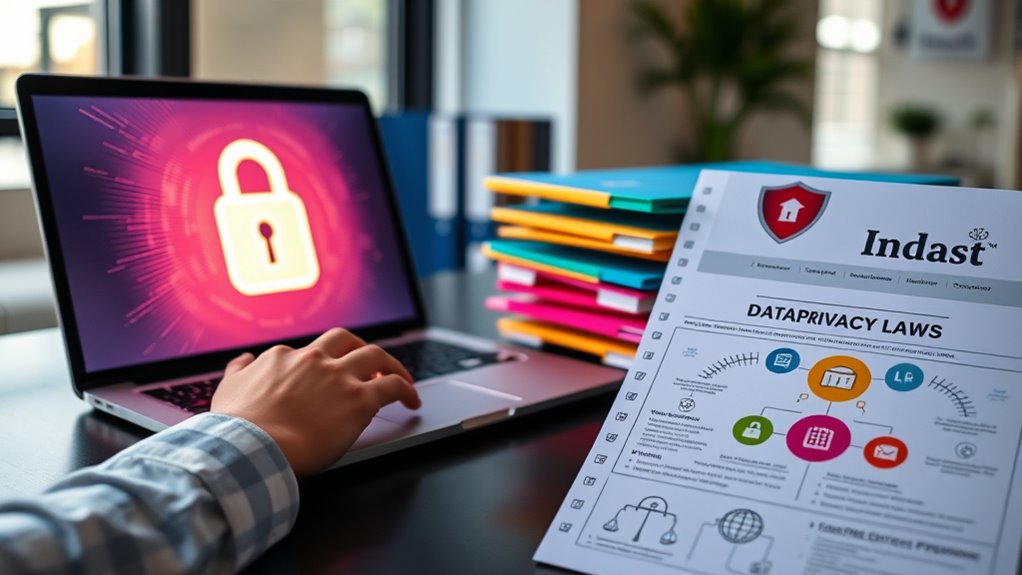Data privacy laws protect your personal records by setting rules on how organizations can collect, store, and share your data. They give you rights to access, correct, or delete your information and require companies to get your consent before gathering data. If a breach happens, laws mandate immediate notification and measures to prevent further harm. Understanding these protections can help you stay in control of your digital footprint, and exploring further will reveal how these laws keep your information safe.
Key Takeaways
- Data privacy laws protect personal information from unauthorized access, misuse, and breaches.
- They grant individuals rights to access, correct, delete, and control their personal data.
- Organizations must obtain consent and be transparent about data collection and usage practices.
- In case of breaches, laws require prompt notification and measures to minimize harm.
- These laws foster trust, accountability, and a safer digital environment for personal records.

Data privacy laws are essential regulations designed to protect your personal information from misuse and unauthorized access. These laws set the standards for how organizations collect, store, and handle your data, ensuring your digital rights are respected. When companies or institutions fail to follow these rules, your sensitive information can be vulnerable to breaches that compromise your privacy and security. Understanding these laws helps you recognize your rights and the protections in place, so you can take action if your data is mishandled or exposed during a data breach.
Your digital rights include the right to know what data is being collected about you, how it’s used, and who has access to it. Data privacy laws empower you to request access to your personal records, correct inaccuracies, or even delete your information when appropriate. They also require organizations to obtain your consent before collecting or processing your data, giving you greater control over your digital footprint. This control is crucial because, in today’s interconnected world, data is a valuable commodity, and misuse can lead to identity theft, financial loss, or reputational damage. Additionally, these laws promote transparency and accountability in data handling practices, reinforcing trust between consumers and organizations.
However, despite these protections, data breaches remain a significant concern. When a breach occurs, your personal information can become exposed without your knowledge, leading to potential harm. Many data privacy laws specify the steps organizations must take if a breach happens, including notifying affected individuals promptly and taking measures to mitigate further damage. These requirements aim to hold organizations accountable and reduce the risk of your information falling into the wrong hands.
To better understand how these laws work, consider the importance of transparency. Organizations are often required to clearly explain their data practices, so you can make informed decisions about sharing your information. This transparency also helps you identify whether a company is trustworthy and compliant with legal standards. When an organization respects your digital rights and adheres to data privacy laws, you gain confidence that your personal records are protected from unwarranted access and misuse.
Frequently Asked Questions
How Do Data Privacy Laws Vary Internationally?
You’ll find that data privacy laws vary internationally due to cross border compliance requirements and cultural differences. Some countries, like the EU, have strict regulations such as GDPR, while others may have more lenient rules. You need to understand these differences to make certain of legal compliance when handling personal records across borders. Recognizing cultural attitudes towards privacy helps you navigate legal landscapes and protect individual rights effectively worldwide.
What Rights Do Individuals Have Under Data Privacy Laws?
You have important personal data rights under privacy laws, including the right to access, correct, or delete your data. You can often request information about how your data is used and limit its processing. Privacy enforcement guarantees organizations follow these rights, giving you control over your personal information. Stay informed about your rights, and don’t hesitate to exercise them if you believe your privacy has been compromised.
How Can I Ensure My Data Is Legally Protected?
Did you know that over 80% of consumers prioritize data security? To guarantee your data is legally protected, focus on consent management by clearly controlling how your information is shared. Use data encryption to safeguard sensitive details from unauthorized access. Regularly review privacy settings and stay informed about relevant laws. Taking these steps helps you maintain control and comply with legal requirements, giving you peace of mind about your personal data.
What Are Common Penalties for Data Privacy Violations?
When you violate data privacy laws, you risk facing serious fines and penalties. Common consequences include hefty fines for data breaches, which can reach into millions of dollars depending on the severity and scope. You might also face legal actions, reputation damage, and mandated corrective measures. Protecting personal records is vital, so make sure you follow regulations to avoid these penalties and safeguard both your organization and individuals’ privacy.
How Do Data Privacy Laws Apply to Online Services?
You’re responsible for how online services handle user data. Data privacy laws require you to protect personal information from data breaches and guarantee proper consent management. This means you must clearly inform users about data collection, obtain their consent, and implement security measures. If you fail to do so, you risk legal penalties. Staying compliant involves regularly reviewing your data practices and respecting user privacy rights.
Conclusion
As you navigate the complex world of data privacy laws, remember that your personal records are more vulnerable than ever. Laws are evolving, and new regulations could change everything overnight. Will you stay informed and protected, or leave your data exposed? The choices you make today could determine your privacy tomorrow. Stay vigilant, because what you don’t know might just come back to haunt you when you least expect it.









